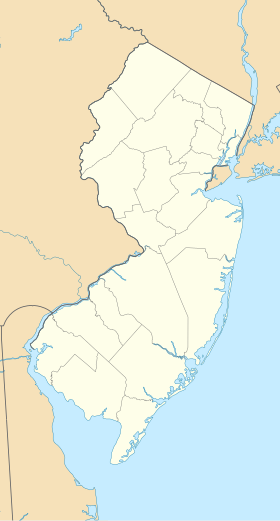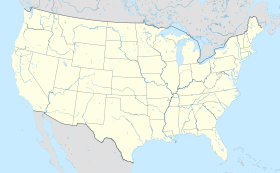Equestrian statue of George Washington (Newark)
| George Washington | |
|---|---|
 George Washington in profile | |
| Artist | J. Massey Rhind |
| Year | 1912 |
| Medium | Bronze sculpture |
| Subject | George Washington |
| Dimensions | 2.6 m × 1.7 m × 3.8 m (8.5 ft × 5.5 ft × 12.5 ft) |
| Location | Washington Park Newark, New Jersey |
| 40°44′33.4″N 74°10′10.9″W / 40.742611°N 74.169694°W | |
George Washington | |
| Part of | James Street Commons Historic District. (ID78001758[1]) |
| Designated CP | January 9, 1978 |
George Washington is an outdoor equestrian statue by the Scottish-American sculptor J. Massey Rhind located in Washington Park in Newark, New Jersey. It depicts General George Washington saying farewell to the troops of the Continental Army on November 2, 1783, and was dedicated on the anniversary of that event in 1912.
History
[edit]Sculptor J. Massey Rhind was commissioned to do the work, funded by the bequest of Amos H. Van Horn (1840–1908), owner of one of the largest furniture stores in Newark.[2] Born in Edinburgh, Rhind (1860–1936) had a workshop in New York City and was known for the classical caryatids at Macy's Department Store on 34th Street.[3] Rhind's proposal was for a distinctive equestrian statue, showing General Washington saying farewell to the troops and standing beside, rather than mounted on, his horse, which helped secure the commission.[2][4] The statue was cast in 1912 by the Roman Bronze Works of New York City,[5] which had also done the casting of Rhind's sculptures for the Stephenson Grand Army of the Republic Memorial in Washington, D.C.[6] George Washington was installed in Newark's Washington Park and dedicated on November 2, 1912, the anniversary of the event depicted.[2][7] President William H. Taft was scheduled to deliver an address at the dedication, but then had to attend the funeral of vice-president James S. Sherman, who had died three days earlier, on October 30.[8]
Description
[edit]
The bronze sculpture depicts General Washington saying his farewell address to the troops of the Continental Army at Rocky Hill, New Jersey, on November 2, 1783. This event was after word of the peace treaty ending the American Revolutionary War had arrived from Paris. The statue shows Washington, dismounted from his horse, in military uniform, and with a riding cloak over his shoulder. His horse is shown with a raised foot and lowered head. The statue measures approximately 8 feet 6 inches (2.59 m) high x 5 feet 6 inches (1.68 m) wide x 12 feet 6 inches (3.81 m) long and is on a stone base that measures approximately 2 feet (0.61 m) high x 14 feet 8 inches (4.47 m) wide x 15 feet 7 inches (4.75 m) long.[4][5]
Legacy
[edit]After its dedication in 1912, brewery mogul Christian William Feigenspan commissioned Rhind for a copy of the equestrian statue of Bartolomeo Colleoni in Venice. The statue was dedicated in Newark's Clinton Park (now Lincoln Park) on July 28, 1916.[9][10]
The Washington statue was added to the National Register of Historic Places as a contributing property of the James Street Commons Historic District on January 9, 1978.[11] It was surveyed by the Save Outdoor Sculpture program of the Smithsonian American Art Museum in 1995.[12]
See also
[edit]- List of public art in Newark, New Jersey
- List of statues of George Washington
- List of sculptures of presidents of the United States
- List of equestrian statues in the United States
- New Jersey in the American Revolution
- Timeline of Newark, New Jersey
- Rockingham – Where Washington wrote his farewell orders
References
[edit]- ^ "National Register Information System – (#78001758)". National Register of Historic Places. National Park Service. November 2, 2013.
- ^ a b c "Businessman Leaves Lasting Reminders of Leaders and Heroes". Newark Public Library. September 4, 1997.
Unlike many other memorials to the country's first president, this equestrian version portrays Washington dismounted.
- ^ "Macy's Caryatids, (sculpture)". Inventory of American Sculpture, Smithsonian Institution Research Information System. Smithsonian American Art Museum.
- ^ a b "This Latest Equestrian Statue of Washington is Distinctly Different". International Gazette. Buffalo, New York. February 18, 1911. p. 3 – via Newspapers.com.
The Rhind Washington shows the general standing beside his charger, facing outward.
- ^ a b "George Washington, (sculpture)". Inventory of American Sculpture, Smithsonian Institution Research Information System. Smithsonian American Art Museum.
- ^ "Stephenson Grand Army of the Republic Memorial, (sculpture)". Inventory of American Sculpture, Smithsonian Institution Research Information System. Smithsonian American Art Museum.
- ^ "Taft to Dedicate Washington Statue". The Morning Post. Camden, New Jersey. October 29, 1912. p. 5 – via Newspapers.com.
It has been found possible to dedicate the statue on the very anniversary day of the episode just described.
- ^ Urquhart, Frank J. (1913). "A History of the City of Newark, New Jersey: Embracing Practically Two and a Half Centuries, 1666–1913". Lewis Historical Publishing. pp. 841–842. OCLC 7981444.
- ^ Zakalak, Ulana D. (April 13, 1994). "Public Sculpture in Newark, New Jersey". National Park Service.
- ^ "Colleoni Statue, (sculpture)". Inventory of American Sculpture, Smithsonian Institution Research Information System. Smithsonian American Art Museum.
- ^ Vacca, Anthony S. (August 1976). "National Register of Historic Places Inventory/Nomination: James Street Commons Historic District". National Park Service. With accompanying 59 photos
- ^ "George Washington, (sculpture)". Smithsonian American Art Museum.
External links
[edit] Media related to Statue of George Washington Newark at Wikimedia Commons
Media related to Statue of George Washington Newark at Wikimedia Commons- Washington, George (November 2, 1783). "Washington's Farewell Address to the Army". Founders Online, National Archives.
- Sculptures by J. Massey Rhind
- Statues of George Washington
- Public art in Newark, New Jersey
- 1912 sculptures
- Bronze sculptures in New Jersey
- Equestrian statues in New Jersey
- Monuments and memorials in New Jersey
- Monuments and memorials to George Washington in the United States
- Outdoor sculptures in New Jersey
- Sculptures of men in New Jersey
- National Register of Historic Places in Newark, New Jersey
- Historic district contributing properties in Newark, New Jersey
- New Jersey in the American Revolution



